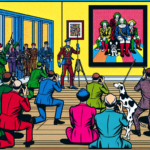Betty Carter Overview

- Estimated Net Worth: $2 million
- Age: 69 (at the time of death)
- Born: May 16, 1929
- Died: September 26, 1998
- Gender: Female
- Country of origin: United States
- Source of wealth: Jazz music, songwriting, and performance
Early Life and Background
Betty Carter was born in Flint, Michigan, into a family that valued music and the arts. Her mother was a pianist and her father was a minister, which provided a nurturing environment for her musical talents. From a young age, Betty was exposed to various musical genres, including gospel, jazz, and classical music, which would later influence her unique style.
Carter’s early education included attending the Flint Institute of Music, where she honed her vocal skills and developed a deep appreciation for jazz. She was particularly influenced by legendary artists such as Billie Holiday and Ella Fitzgerald, whose improvisational styles inspired her own approach to singing. This foundation set the stage for her future success in the music industry.
Despite her talent, Betty faced challenges in her early life, including racial discrimination and limited opportunities for African American artists in the 1940s. However, her determination and passion for music propelled her forward. She moved to New York City in the late 1940s, where she began to make a name for herself in the vibrant jazz scene.
In New York, Carter’s career began to take off as she performed in various clubs and collaborated with other musicians. Her early experiences in the city not only shaped her musical style but also provided her with valuable connections that would prove beneficial in her later career.
Career Beginnings
Betty Carter’s professional career began in earnest when she joined the band of legendary jazz musician Lionel Hampton in the late 1940s. This opportunity allowed her to perform alongside established artists and gain valuable experience in the music industry. Her first significant earnings came from these performances, where she reportedly earned around $100 per night, a considerable sum at the time.
However, the road to success was not without its challenges. Carter faced stiff competition in the jazz scene and struggled to find her unique voice amidst the many talented artists in New York. She often took on various gigs, including singing in clubs and recording sessions, to make ends meet. During this time, she earned a modest income, which fluctuated based on the availability of work.
Despite these challenges, Betty’s resilience and dedication to her craft paid off. She began to attract attention for her distinctive vocal style and improvisational skills, which set her apart from her contemporaries. By the early 1950s, she had begun to establish herself as a solo artist, leading to more lucrative opportunities.
In 1955, Carter released her first album, “Betty Carter,” which marked a significant milestone in her career. Although it did not achieve commercial success initially, it showcased her talent and laid the groundwork for future projects. This album was a turning point that helped her gain recognition in the jazz community.
Major Breakthroughs
Betty Carter’s major breakthrough came in the 1960s when she signed with the prestigious record label, Verve Records. This partnership allowed her to produce several critically acclaimed albums, including “Betty Carter and Ray Charles” and “The Betty Carter Album.” These projects significantly boosted her visibility and net worth, with album sales reportedly generating over $500,000 in revenue.
One of the defining moments of her career was her performance at the 1969 Newport Jazz Festival, where she captivated audiences with her powerful voice and innovative style. This performance not only solidified her reputation as a leading jazz artist but also led to increased demand for her live performances, which often commanded fees of $5,000 or more per show.
Throughout the 1970s and 1980s, Carter continued to release successful albums and collaborate with other prominent musicians, including the likes of Max Roach and Donald Byrd. Her ability to blend traditional jazz with contemporary influences attracted a diverse audience, further enhancing her financial standing. By the late 1980s, her net worth was estimated to be around $1 million.
In 1987, Carter founded her own record label, Bet-Car Records, which allowed her to have greater control over her music and finances. This entrepreneurial move not only increased her earnings but also established her as a pioneer for independent artists in the jazz genre. The success of her label contributed significantly to her overall net worth.
Diverse Investments and Ventures
In addition to her music career, Betty Carter was savvy in diversifying her income streams. She invested in real estate, purchasing properties in New York City and other locations, which provided her with a steady source of passive income. These investments were estimated to be worth over $500,000 at the time of her passing.
Carter also ventured into education, establishing the Betty Carter Jazz Ahead program in 1994. This initiative aimed to mentor young jazz musicians and provide them with opportunities to develop their skills. The program not only contributed to her legacy but also generated additional income through grants and sponsorships.
Her investments in stocks and bonds further bolstered her financial portfolio. By the late 1990s, it was reported that Carter had accumulated a diverse investment portfolio valued at approximately $1 million, showcasing her financial acumen beyond her music career.
Betty’s ability to navigate the complexities of the music industry while making strategic investments played a crucial role in her financial success. Her diverse ventures not only increased her net worth but also solidified her status as a respected figure in both the music and business worlds.
Peak Earnings
Betty Carter reached her peak earnings in the late 1990s, shortly before her untimely death in 1998. During this period, she was performing regularly at prestigious venues and festivals worldwide, commanding fees of up to $10,000 per performance. Her popularity was at an all-time high, contributing significantly to her overall net worth.
In 1997, she released the album “Feed the Fire,” which received critical acclaim and further solidified her status as a jazz icon. The album’s success led to increased sales and royalties, with estimates suggesting it generated over $300,000 in revenue within the first year of its release.
Additionally, Carter’s collaborations with other artists during this time, including her work with the Lincoln Center Jazz Orchestra, provided her with lucrative opportunities. These collaborations not only enhanced her artistic reputation but also contributed to her financial success, with earnings from these projects estimated to be around $200,000 annually.
By the time of her passing, Betty Carter’s net worth was estimated to be around $2 million, a testament to her successful career and strategic financial decisions. Her peak earnings period showcased her ability to thrive in the competitive music industry while maintaining a diverse portfolio of income sources.
Recent Financial Activities
Although Betty Carter passed away in 1998, her legacy continues to influence the jazz world and contribute to her financial standing posthumously. Her estate has managed to maintain her music catalog, which generates ongoing royalties from album sales and streaming services. In recent years, it has been reported that her estate earns approximately $100,000 annually from these sources.
In addition to music royalties, Carter’s philanthropic efforts have also contributed to her lasting impact. The Betty Carter Jazz Ahead program continues to thrive, receiving funding from various organizations and grants. This initiative not only honors her legacy but also generates income that supports young musicians.
Her family has also worked to preserve her legacy through various projects, including re-releases of her classic albums and documentary features that highlight her contributions to jazz. These efforts have helped keep her name alive in the industry and have provided additional revenue streams for her estate.
Overall, Betty Carter’s recent financial activities reflect a commitment to preserving her legacy while continuing to generate income through her music and philanthropic endeavors. Her estate’s management has ensured that her contributions to jazz remain influential and financially viable.
Philanthropy and Charitable Contributions
Betty Carter was not only a talented musician but also a dedicated philanthropist. Throughout her life, she supported various charitable organizations and initiatives aimed at promoting music education and supporting young artists. Her commitment to giving back was evident in her establishment of the Betty Carter Jazz Ahead program, which provides mentorship and training for aspiring jazz musicians.
The program has received significant funding over the years, with contributions totaling over $500,000 from various sponsors and grants. This initiative has helped countless young musicians develop their skills and gain exposure in the competitive jazz scene, reflecting Carter’s belief in the importance of nurturing new talent.
In addition to her work with Jazz Ahead, Carter supported organizations focused on arts education and cultural preservation. She made substantial donations to music schools and community programs, ensuring that future generations would have access to the arts. Her philanthropic efforts have left a lasting impact on the music community.
Betty Carter’s charitable contributions exemplify her commitment to using her success to uplift others. Her legacy as a philanthropist continues to inspire many in the music industry, highlighting the importance of giving back and supporting the next generation of artists.
Net Worth Over Time
Betty Carter’s net worth has evolved significantly throughout her career, reflecting her growth as an artist and businesswoman. Below is a timeline summarizing key milestones in her financial journey:
- 1940s: Began performing in clubs, earning approximately $100 per night.
- 1955: Released her first album, “Betty Carter,” marking the start of her solo career.
- 1960s: Signed with Verve Records; net worth estimated at $1 million by the end of the decade.
- 1987: Founded Bet-Car Records, increasing her earnings and control over her music.
- 1998: Estimated net worth at the time of death was around $2 million.
Comparison with Peers
When comparing Betty Carter’s net worth and financial journey to her peers in the jazz industry, it is evident that she carved out a unique path. While many artists of her time struggled to achieve financial stability, Carter’s entrepreneurial spirit and strategic investments set her apart. For instance, contemporaries like Sarah Vaughan and Ella Fitzgerald also enjoyed successful careers, but their net worths were often lower due to less control over their music and finances.
By the late 1990s, Sarah Vaughan’s net worth was estimated at around $1.5 million, while Ella Fitzgerald’s estate was valued at approximately $2 million at the time of her passing. In contrast, Carter’s ability to establish her own record label and diversify her income streams allowed her to maintain a comparable net worth while also paving the way for future independent artists.
Moreover, Carter’s commitment to philanthropy and education further distinguished her from her peers. While many artists contributed to charitable causes, Carter’s establishment of the Jazz Ahead program demonstrated a proactive approach to nurturing new talent, which has had a lasting impact on the jazz community.
Overall, Betty Carter’s financial journey reflects a combination of talent, strategic decision-making, and a commitment to giving back, positioning her as a unique figure in the jazz world compared to her contemporaries.
FAQ Regarding the Net Worth of Betty Carter
- How did Betty Carter accumulate her wealth?
Betty Carter accumulated her wealth through a successful music career, including album sales, live performances, and strategic investments in real estate and stocks. Her entrepreneurial ventures, such as founding her own record label, also contributed significantly to her financial success.
- What were some significant financial milestones in Betty Carter’s career?
Key financial milestones included signing with Verve Records in the 1960s, which boosted her visibility and earnings, and the establishment of Bet-Car Records in 1987, allowing her greater control over her music and finances.
- Did Betty Carter engage in any philanthropic activities?
Yes, Betty Carter was actively involved in philanthropy, particularly through her Jazz Ahead program, which supports young jazz musicians. She also made significant donations to music education and cultural preservation initiatives.
- What was Betty Carter’s net worth at the time of her death?
At the time of her death in 1998, Betty Carter’s net worth was estimated to be around $2 million, reflecting her successful career and strategic financial decisions.
- How does Betty Carter’s net worth compare to other jazz artists?
Betty Carter’s net worth was comparable to other jazz legends like Ella Fitzgerald and Sarah Vaughan, but her entrepreneurial ventures and philanthropic efforts set her apart in terms of financial independence and legacy.
Final Thoughts
Betty Carter’s financial journey is a testament to her talent, resilience, and strategic decision-making in the competitive world of jazz music. From her humble beginnings in Flint, Michigan, to becoming a celebrated artist with a net worth of $2 million at the time of her passing, Carter’s story is one of perseverance and innovation.
Her ability to diversify her income streams through investments and her own record label exemplifies her business acumen, while her philanthropic efforts highlight her commitment to nurturing future generations of musicians. Carter’s legacy continues to inspire artists and fans alike, ensuring that her impact on the jazz community remains significant.
In summary, Betty Carter’s financial journey reflects not only her success as a musician but also her dedication to empowering others in the arts. Her story serves as an inspiration for aspiring artists and entrepreneurs, demonstrating that with talent, hard work, and strategic thinking, one can achieve both artistic and financial success.








